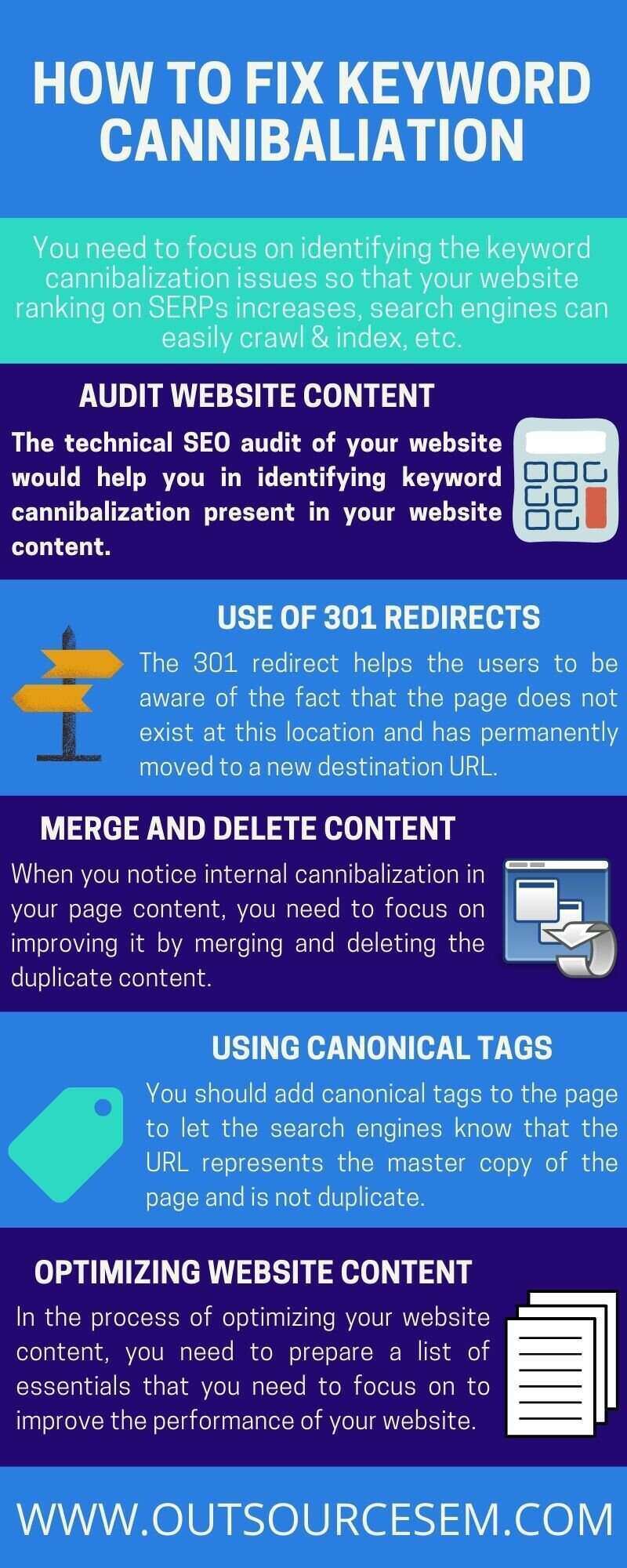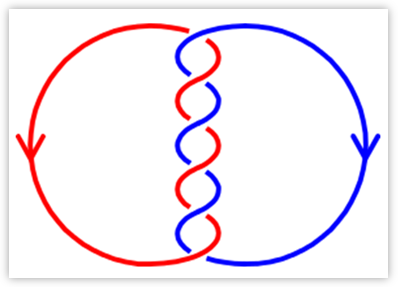The old-age proverb ‘too much of anything is bad’ still holds importance in the modern world. With Google receiving nearly 5.6 billion searches per day, there is no denying the fact that users are getting more accustomed to the online marketing world. With such a wide range of users to target, it becomes vital to improve your SEO efforts to ensure that none of the target audience is left untouched. In the process of enhancing the SEO campaign performance, one of the critical actions that you need to keep an eye on is avoiding keyword cannibalization in SEO content.
With myths surrounding SEO, marketers think that their website content may not have better visibility and thus include multiple keywords. However, this tactic may backfire at times when you have the same keywords used on multiple pages and are competing for the same post (search query). When search engines like Google or Bing look to identify which pages to display for the keywords or search terms entered, they get confused when two pages on your website are competing to rank for the same keyword. To avoid these confusions in Google SEO or Bing SEO, you need to fix keyword cannibalization. As the ranking algorithms of search engines keep updating, they react harshly to keyword cannibalization, which may lead to losing search traffic, search engine penalties and much more. Thus, in your SEO plan & strategy, you need to focus on identifying the keyword cannibalization issues so that your website ranking on SERPs increases, search engines can easily crawl & index multiple pages, etc.
What is keyword cannibalization
Keyword cannibalization in SEO occurs when two or more pages on a website compete for the same keyword. It means you have articles, blog posts, product page descriptions, etc., on your website that can rank for the same keywords or search terms entered by the user. This happens due to the fact that your website has too less or thin content or you have optimized for the same keyphrases or keywords.
When you work on keyword research to write great content for your website, the critical point you focus on is choosing high traffic relevant keywords. The main focus is on determining the keywords with high search volume so that you see the most relevant audience reaching your website. When Google crawls a website that has multiple pages targeting the same keyword, it gets confused about which page to display with the most relevant content. The confusion may lead search engines to display less pertinent content to the users. Search engine crawlers are left to think about the most identical pages that best match the users' search query. When you have internal cannibalization in your on-page SEO content, then instead of having a quest with the competitors for a higher ranking on the SERPs, the pages fight with each other to get noticed.
To ensure that you target the right audience, you do keyword research so that when these relevant audiences reach your landing page, they take the intended action. To choose the best matching keywords for your business, you should consider preparing a seed keyword list so that the keyword planner tool suggests the best keyword matches for the location you are targeting. The main issue with SEO keyword cannibalization is that search engines have their own ranking algorithm and separate entity for page ranking. So, by identifying keyword cannibalization issues on your page, the search engines may display the irrelevant pages to the users. This may lead to losing website traffic, losing users’ trust in your website, lowering the click-through rate and ultimately, return on investment.
How to fix keyword cannibalization?

1. Audit your website content - The most essential part of your strategy to fix keyword cannibalization is auditing your website content. The technical SEO audit of your website would help you in identifying keyword cannibalization present in your website content. Running an SEO audit would help you identify duplicate content present on your pages. This would help you know the ranking of keywords on the search engines.
Whether it is running a PPC campaign or SEO campaign, the main point in digital marketing revolves around the keywords chosen by the digital marketers. Be it the point of writing ad copies, ad descriptions, etc., in PPC ads or writing title tags, meta descriptions, etc. search engine optimization mainly focuses on including primary keywords. At times, your page may be ranking for the secondary keywords, so you must consider optimising it to get more users associated with your business.
The SEO audit of your website shows the status of your keywords, whether you are ranking for it or not. When you prepare an SEO report from the audit you have done, you also get to see the performance of various SEO metrics. The most important metrics related to your business may include organic traffic, backlink analysis, keyword rankings, referring domains, etc. The SEO audit of your website would help you know whether you have used the keywords in external links, internal links, etc. You can avail of offshore SEO services and hire virtual assistants from an offshore digital marketing company so that the SEO professionals work on improving the performance of SEO campaigns.

2. Use of 301 redirects - The next vital point to focus on to fix keyword cannibalization is using 301 redirects. A 301 redirect is the permanent moving of the page from one location to another. The 301 redirect helps the users to be aware of the fact that the page does not exist at this location and has permanently moved to a new destination URL. This solves the keyword cannibalization issue in SEO. The users get to know that this business page does not exist anymore, which ultimately leads to increasing users’ trust, building brand awareness, etc.
The redirects play a crucial role in gaining users' trust in your website as they believe that the business thinks from the users' perspective and thus provides information about the page. It would be best to consider adding image alt text on the web pages so that the users get to have a clear idea of what the business seems to be doing. As you focus on strategic marketing to make plans & strategies for your SEO campaign based on users’ intent, similarly, when any business is working on website design, the users are curious to know what they would get after it is live. You can consider performing content marketing, email marketing, etc., to focus on building buyer persona and using this urgency to convert, leading to an increase in the conversion rate.
When the page shows any type of 301 or 302 redirects, you should consider adding a clear picture or description, providing them with clear information about your business intent. With so many errors like 4xx errors, 5xx erros, etc., you need to consider reducing internal cannibalization issues on your web content so that the search engine gives a better ranking. The 302 redirects need to work properly as it affects the page rank, brand authority, etc. Some of the points you can focus on fixing the keyword cannibalization issue are listed below.
a. Write descriptions to inform when the page will be back.
b. Use relevant call to action to make the user take the intended action.
c. Focus on using image alt text till the final URL shows relevant content.

3. Merge and delete content - The next important point to focus on working on to fix keyword cannibalization, is to merge and delete content. When you notice internal cannibalization in your page content, you need to focus on improving it by merging and deleting the duplicate content. The page content may have various long-tail keywords or key phrases that have internal cannibalization issues. So, you need to focus on choosing the best position to place the keywords.
When you take the necessary steps to optimize the keyword cannibalization in the SEO content of your web page, you need to be very sure of the position where you wish to keep the keyword. This is necessary as it may harm your SEO website if the necessary keyword is removed from the content that the page is ranking for. As in a pay-per-click ad campaign, you see your ad rank & position based on the keywords that you are targeting. To avoid the search terms that you do not wish your PPC ads to appear, you add negative keywords that trigger your ads from appearing.
As search engine optimization requires focusing on writing great content to lure the users' attention to the web page, similarly, you need to leverage content marketing to build brand awareness and make the target audience take the intended action. You need to focus on improving the website navigation and on the point that the headers h1,h2, etc., have primary or secondary keywords. Some of the points that you can focus on to merge and delete content are listed below.
a. If two or more pages attract the same audience, then you can combine them on a single page. You can divide the page into different sections and subsections.
b. You can write long content but ensure that the internal cannibalization issue is not present.
c. Merge articles and blogs into a single section so that the same keywords do not appear on the other pages. Like - Facebook Ads, Facebook advertising mistakes to avoid, Facebook Ads remarketing strategies, Facebook Ads targeting options, etc.
4. Using canonical tags to avoid duplicate content - The next point to focus on in keyword cannibalization is using canonical tags. The canonical tags are used to inform the search engine that the content on the web page is not duplicated. As multiple pages are present on a website, there are chances that the search engine gets confused to deciding which page to display to the users for the keywords or search terms entered.
When multiple pages are present on a website, you need to consider using SEO pagination in your marketing strategy to avoid displaying the best possible results to the target audience. This reduces clusters on the webpage and the user can easily navigate through different sections on the page to look for the desired content. You should add canonical tags to the page to let the search engines know that the URL represents the master copy of the page.
Identifying keyword cannibalization and fixing it is quite necessary to improve the users' trust in the website. Keyword cannibalization in SEO makes it hard to grab the web page's users' attention. They think that the same content is repeated, making them feel that duplicate content is present. As you focus on writing resonating content for your website, you need to ensure that there is no keyword stuffing so that the users can easily identify the relevant content and take the intended action.
Suppose you run e-commerce PPC ads and have product description pages. As these products keep varying with the e-commerce trends, they may have different specifications based on color, size, etc. In order to avoid the search engines from finding the page as canonicalized, you must ensure that you add canonical tags to them. You can also consider robots.txt to the pages to prevent the search engines from crawling and indexing important information on the website. Some of the points that you can focus on in keyword cannibalization when working to fix keyword cannibalization in SEO are listed below.
a. Canonicalize near-duplicates.
b. Ensure that the right page is canonicalized.
c. The pages should be crawlable and indexable.
d. Canonicalize homepage.
e. These tags should be self-referential.

5. Optimizing website content - The next essential point to focus on when you work on avoiding keyword cannibalization in your SEO content is optimizing website content. As this is an on-page SEO issue, you need to focus on the point that you fix SEO mistakes present on the website. You may consider conducting an SEO audit to determine which of the SEO metrics need to be optimized. The content on the page may have long-tail keywords, unstructured navigation patterns, etc. You can also focus on conducting SEO keyword research to determine which of the relevant high traffic keywords you need to improve your website ranking on the SERPs. The better content you have on the webpage, the better the chances of the user getting associated with your business and taking the intended action.
As internal cannibalization is an on-page SEO, so you need to focus on optimizing the website content to make the target audience choose your website ahead of the competitors. Optimizing the website content helps in writing great content to build brand awareness. The users who once get associated with your brand name choose your business every time for the relevant search terms or keywords entered. Also, when your brand popularity grows, the users do not have a second thought to choose your business. This also helps in affiliate marketing as the users promote your business to near & dear ones, thus helping in peer-to-peer marketing.
In the process of optimizing your website content, you need to prepare a list of essentials that you need to focus on to improve the performance of your website. These may be focusing on SEO keywords, long-tail keywords, on-page SEO, etc., to fix keyword cannibalization issues. Some of the points you can focus on in optimizing the website content are listed below.
1. Conduct thorough SEO keyword research.
2. Optimizing page loading speed.
3. Optimize website for mobile devices.
4. Getting quality backlinks.
5. Focus on optimizing off-page SEO.

Impacts of keyword cannibalization
A. Reduces page authority - The impact that SEO keyword cannibalization has is that it reduces the page authority of your website. When you have keyword cannibalization in your SEO content, you see that you are losing website traffic. This indicates that the page authority of your website reduces. When the page authority of your website reduces, you see that the users do not trust your website and the search engines lower your website ranking. So, you need to focus on improving the page authority so that the number of users on your website scales high.
• Have links to the pages that you are optimizing in keyword cannibalization.
• Building your domain authority.
• Regularly remove harmful/spammy links.
• Make sure that your page has useful content.
B. Dilutes your internal links - The next impact that keyword cannibalization has on your website content is that it dilutes internal links. As multiple links are present on a website and your page is divided into different sections and subsections, you add many internal links from one page to another. You must be having various call to action tabs being displayed on a webpage that takes the user from one page to the final page where they can take the intended action.
As the pages on the website have keywords cannibalized, your internal links get diluted because the search engine is confused about whether the link to your web page is original or the other one that is used. So, you need to make sure that the internal links are clearly defined and do not have separate canonical tags for every URL.

C. Devalues the most relevant content - Another essential impact that keyword cannibalization has on your website is that it devalues the most relevant content present on the website. You may have written great how-to content for your website and worked on strategic marketing to leverage this content to drive traffic, build brand awareness on social media platforms, etc. But, when your page has internal cannibalization, the search engine devalues even the most relevant and high-performing content, thinking it would duplicate the other ones.
You need to have a clear idea of which pages on your website have the most relevant content and which pages rank for the users’ search queries. When the search engine crawlers look for the pages to be displayed to the users' search terms, they get confused about which pages to display. So, this means all your efforts in writing great content go in vain as when they do not appear for the search query, what is the point of spending time and money on this content.
D. Squanders your crawl budget - The next impact of keyword cannibalization in SEO is that it squanders your crawl budget. As you have a specific advertising budget that you wish to spend for your PPC ad campaigns, similarly, you have a defined budget for your SEO website. The crawl budget gets wasted when the search engine crawlers identify keyword cannibalization in your SEO content. A crawl budget is the number of times a search engine crawls through your website within a given time frame. Having multiple pages based on the same keyword means that the incorrect pages may be indexed. So, the duplicate content on your web page affects the crawl budget and you may have to spend more than the desired budget.

E. Harms page quality - The next impact of keyword cannibalization is that it harms your page quality. With all your efforts in writing website content, identifying keyword cannibalization harms the page quality. The users think that the website is just elaborating the content and thus does not focus on writing unique content. The users' urgency to move ahead also diminishes and they also lose trust in your website.
F. Affects conversion rate - The next impact that keyword cannibalization has on your website is that it affects the conversion rate. When users on your web page see multiple pages being displayed for the same keywords or search terms entered, they are messed up on which page to consider more relevant. A sense of doubt arises in the user’s mind about whether the page has duplicate content, the external links to the page are from gray hat sites, etc.
As the users are in a state of doubt about whether they should trust the website or not, this impacts your website negatively. You may see a high impression share for your website, but when they find keyword cannibalization in the content, they leave the website and may see the bounce rate going high. WIth SEO metrics to track in Google Analytics, you can also analyze bounce rate and then take the necessary steps to optimize it.

Conclusion
Seo keyword cannibalization is a common issue and it expands with the growth of your website. None of the websites can be said to be immune to it. However, this does not mean that this SEO issue cannot be resolved. By identifying the keyword cannibalization issue, you get to know which of the target keywords you are competing with. As you have to deal with your own keywords, it becomes a challenging task to handle and may affect the success of your campaign.
Highlighting and fixing keyword cannibalization is an essential step to perform as this can potentially increase your ranking on the SERPs and increases your organic search. You need to delete or rewrite posts that increase competition and prevent you from achieving your marketing goals. If you find identifying keyword cannibalization issues in your SEO content a tough task to perform, you can get in touch with a digital marketing company with expertise in small business SEO, guest posting, link building, SEO analytics, conversion analysis, market research, etc. Avail of white label SEO services today and see a drastic increase in conversion rate, revenue generated, etc.
Further by hiring digital marketing experts from a SEO agency you can avail social media marketing services, SEO detox and penalty removal services, reputation management, virtual assistant services and so on for your client. Whether you're into an electrician, flooring, roofing, lawyer services, or a small business owner in any industry, our top-notch SEO services, including electrician SEO, flooring SEO, roofing SEO, lawyer SEO, and small business SEO services, can help you outrank competitors on SERPs and boosts your ROI. Our expert team will implement proven strategies to boost online visibility, attract qualified leads, and drive conversions.
References
• Keyword cannibalization: what it Is and how to avoid it
• How to identify & eliminate keyword cannibalization to boost your SEO
